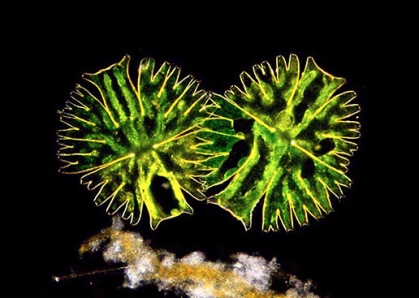About the Microbiology Undergraduate Program

Microorganisms are the smallest living things, the oldest form of life on earth, ubiquitous in the biosphere and central to many of the essential life processes on earth. The microbiology curriculum emphasizes the uniqueness of microbial biology, its enormous diversity, and the biochemical basis of microbial life.
The curriculum examines the diverse roles of microorganisms and covers the fundamentals of microbial diversity, physiology and genetics. The focus is on microorganisms, microbial processes in natural and managed environments and their effects on human, animal, plant and environmental health. The curriculum provides students with a fundamental understanding of the various applications of microbes in biotechnology, the food industry, agriculture, and medicine. The curriculum examines the nature and activity of microbial populations in aquatic and terrestrial ecosystems, the interactions within microbial communities, and biogeochemical cycles and energy flows. Recent advances in microbial molecular biology and biotechnology have led to an in-depth understanding of the physiology, genetics and taxonomy of microbes. The field of microbiology is a major contributor toward industrial development, human, animal and plant health, environmental integrity and agricultural productivity. Microbes are central to the food, biotechnology and pharmaceutical industries and are broadly utilized from food fermentations and biosynthesis to biodegradation of toxic chemicals.
The primary objectives of the curriculum are to broadly educate students on the biology of microorganisms. The curriculum prepares students for positions in industry, government and graduate/professional study in life sciences through extensive course work combined with laboratory and research experience.
Prospective Students
Set up a meeting with the program director to find out more about our program!
Program Learning Goals
- Graduates will be able to illustrate and describe the biology of microorganisms, focusing on microbial processes and their effects on other organisms and the environment, microbial communities, and biogeochemical cycles. Courses: 11:680:390, 11:680:480, 11:680:481, 11:680:491, 11:680:494
- Graduates will be able to apply the scientific method to formulate questions and hypotheses, design experiments, employ appropriate methodology to solve problems in microbiology, and be able to analyze, interpret, and present scientific data in microbiology. Courses: 11:680:390, 11:680:494; 11:680:492, 11:680:495 (334k PDF), 11:680:497 (95k PDF) and 11:680:498 (95k PDF)
- Graduates will be able to critically evaluate scientific literature and explain their findings in written and oral format. Courses: 11:680:475, 11:680:492, 11:680:495 (334k PDF) |
- Graduates will be able to summarize ethical and current issues in microbiology and apply a code of ethics for microbiologists including ethical conduct, scientific integrity, and the dignity of the profession and practice of microbiology. Courses: 11:680:401, 11:680:492, 11:680:495 (334k PDF)
Program Director
Dr. Ines Rauschenbach
Lipman Hall, Rm. 215
848-932-5635
inesrau@sebs.rutgers.edu
Program Coordinator
Lindsay Vasy
Lipman Hall, Rm. 223A
848-932-5642
lindsay.vasy@rutgers.edu